- Home
- Andrea Penrose
Murder on Black Swan Lane Page 7
Murder on Black Swan Lane Read online
Page 7
“As I’ve told you, it’s simply a business, milord,” she went on. “I do what I have to do in order to survive.”
“Don’t we all?” he muttered.
Her face tightened in the uncertain candlelight. Slanted cheekbones, full mouth, both a bit too strong for her to be considered a conventional beauty. No doubt she frightened many men.
“Somehow I doubt that the fight for survival is an experience you confront every day,” she replied.
“As we only die once, the number of threats seems irrelevant.”
Perhaps it was merely a quirk of the flames, but it seemed that a smile flitted across her lips.
“You seem a shrewd woman. Surely we can come to some sort of bargain.”
She looked down, and several long moments passed as she considered his words.
Deciding on what sum she dared to demand? It would be a hefty one. She was no fool.
“Sorry, but I’m not interested in making a deal.”
“Is there a particular reason?”
“Whether you believed me or not, I am pragmatic. And you are worth a great deal to me as a murder suspect. Bow Street hounding you . . . a trial in the House of Lords . . . the gibbet going up at Tyburn. Why, the scandal could go on for months and months.”
Wrexford blew out a mournful sigh. “I had hoped to appeal to your better nature, m’lady—”
“Do stop calling me that,” she interrupted. “It’s a moniker reserved for my friends.”
“You’ve given me no other name,” he pointed out.
“Mrs. Sloane,” she said tersely.
“Very well.” A small bit of information about her. As were the row of leather-bound books at the back of her desk, whose titles included classic works of history and modern poetry. Mrs. Sloane was a far more educated woman than her present circumstances indicated. Whether that would prove useful remained to be seen.
“As I was saying,” he went on, “I would prefer not to resort to threats, but it seems you give me no choice.”
* * *
Charlotte waited, the thump-thump of her heart against her rib cage making it hard for her to breathe.
“Your career as a satirist depends on anonymity. Were I to expose your identity, I doubt Fores would wish to keep you employed. A woman poking fun at the great men in Society?” He shook his head. “It wouldn’t fadge.”
Bile rose in her throat, hot as acid. “You would strip me of my livelihood?” She pitched her voice low, yet it was shaking with rage “Force me—and the lads—to become paupers to fend for ourselves on the streets? All because I am a woman who dares exercise her talents to survive?”
The earl’s face might well have been carved of granite. Not a muscle twitched. Shadows danced, dark on dark, through his long, curling hair. He appeared implacable, impervious to any appeal for mercy.
Charlotte knew she should have been repelled, but something about the hard-edged planes and sculpted contours of his features held her in thrall. There was a cold beauty to him, and she felt her fingers itch to take up her paintbrush and capture that chilling aura of a man in supreme command of his emotions.
“I’m merely asking for any information you hear that relates to Holworthy’s murder, nothing more. And I am not asking you to aid me from the goodness of your heart.” Wrexford added slowly, his growl rough with sarcasm, “I shall pay you very well. Far more, in fact, than you earn from your tawdry scribbles.”
Stung by his scorn, Charlotte retorted, “Call them what you will, but my art makes quite a lot of blunt.”
“And as I said, I’ll pay you more.” He then named a sum that made her blink.
“H-How do I know you’ll keep your bargain on that?” she demanded.
“Because you have my word on it.” Wrexford shifted on the stool, the slight movement causing the candle flames to sputter. “As a gentleman.”
“Ha. You may have a high and mighty title, milord, but from all I know of your life, you are no gentleman.”
That brought the first flicker of emotion to his face. “You are welcome to ridicule my less than admirable exploits, Mrs. Sloane. But question my honor and—”
“And what? You will challenge me to a duel?” she cut in. “Be advised, I, too, have a very large knife and know how to use it.”
The room went unnaturally still. Charlotte tensed. The earl was notorious for having an explosive temper. And she had just tossed a handful of sparks into the powder keg.
He leaned forward—and let out a peal of laughter.
“Carve me to shreds on paper, Mrs. Sloane. But I have a feeling that in person we will rub together quite enough.
“W-What makes you think that?”
“Because I take care never to underestimate the absurdity of mankind.”
“You have a very cynical view of human nature, milord.”
“Which is something we have in common,” he replied.
The statement took Charlotte aback. “There is a fundamental difference between us, milord. I observe the nuances of how people behave and record what I see in order to earn a living. But, unlike you, I take no glee in the foibles of others.”
“And yet you expose those unfortunate to draw your eye to public ridicule and profit from it. So do you really think you have the right to stand on higher moral ground?”
Charlotte looked away, feeling a little shaken. Was he right? A part of her did take satisfaction in skewering greed, arrogance, and hypocrisy. Did that make her a hypocrite too?
“I make no claim to be a saint, Lord Wrexford,” she said softly.
He laughed again. “All the more reason we will deal well together.” He cocked his head. “We do have a deal, don’t we?”
“Given the alternative, you seem the lesser of two evils,” answered Charlotte. “However, I do have one other demand before the bargain is sealed.”
“The sum I offered is a handsome one—”
“I’m not asking for more money, sir.”
His brows rose in question.
“What I want from you is time. Not a great deal of it, as I imagine you are a busy man.”
“Might I ask for what reason?”
In for a penny, in for a pound. “You have an interesting face. I’d like you to sit for a sketch.”
“You’ve already drawn me,” he said dryly. “Numerous times.”
“Not a caricature, sir. A watercolor portrait,” explained Charlotte. “Simply for art’s sake. It won’t be displayed in public.”
“The request seems harmless enough,” he murmured. “Very well, I agree to your terms.”
“Then yes, we have a deal, sir.”
“Excellent.” The earl looked pleased. Or perhaps a better word was satisfied. He took out another purse from his coat pocket and carefully pushed it across the table. It was considerably larger than the one he had shown to the boys. “Consider this an advance on my promise, Mrs. Sloane. A token that you may trust me.”
Trust. He could purchase a great many things from her, but trust was not one of them.
Charlotte reached out and took the purse. The chamois was tantalizingly soft against her work-callused fingers, the sonorous kiss of gold against gold a sound she hadn’t heard since . . .
Since a long time ago.
Was she making a pact with the Devil? Shaking off a frisson of unease, she tucked it deep within the folds of her gown. It was simply business. There was no reason to feel as if a jolt of unseen electricity had singed her skin.
“I assume you want a token in return,” she said, meeting his gaze. It was unwavering, and yet she sensed he, too, was not unmoved by the moment. “You came here for information—where shall we start?”
The earl didn’t hesitate. “I’d like to have an idea of how you hear all the whispered secrets that you say are floated so freely around Town.”
“As I said, it’s not nearly as nefarious as you think,” answered Charlotte. “I hear things through a great many different sources. To begin with, servants offe
r a wealth of information. Take, for example, my neighbor’s daughter, who works as a tweeny in one of the mansions of Mayfair. The things employers allow their hired help to see and hear would make your hair stand on end. And of course they gossip among themselves, so the secrets spread like wildfire through the underbelly of your gilded world.”
Wrexford nodded thoughtfully. “Go on.”
“I’m patient and willing to piece together all the little bits of color that paint the larger picture. The boys also know a great many of the ordinary eyes and ears in London—the people you think of as invisible. Chimney sweeps, costermongers, flower sellers, shopkeepers.” She paused. “The urchins who clean the muck from the street crossings so you don’t befoul your expensive boots.”
He gazed down at the muddy tips. “I have noticed you seem inordinately interested in my boots. You keep staring at them.”
She shrugged, not ready to reveal her reason quite yet.
Wrexford didn’t press her. His attention was already elsewhere. “Your overview has been most enlightening, but I have a few specific questions I’d like answered.” He sat up a little straighter, the intensity of his eyes sharpening. “Were your depictions of the burns on Holworthy’s face accurate?”
“Yes,” said Charlotte.
“How?” he demanded.
Ah, secrets must now be sacrificed for shillings. She must be very careful in deciding what was—and was not—for sale.
This detail, however, seemed safe enough to hand over. “Because I viewed the body before the night watchman returned with the authorities.”
He looked about to speak, but Charlotte quickly added, “Raven and Hawk heard the watchman screaming about a murder, and rushed to fetch me. And before you ask, I am very observant. I get the little details right.”
He made a face. “You are a singular woman, Mrs. Sloane. Most females would have swooned at the grisly sight.”
“I am not like most women, Lord Wrexford.”
“So I am learning.” He rubbed at his chin. “Hell’s bells, I would have liked to see the body for myself. Observant as you are, you’re not an expert in chemistry. It might prove very helpful to know exactly what substances were used.”
Charlotte saw a way to earn a bit more of the small fortune he had just paid to her. “I happen to know the body was taken to Basil Henning, a medical man in Seven Dials, whose surgery was closest to the church.”
“Henning?” repeated Wrexford. “A gruff, gravel-voiced Scot?”
She nodded. “You know him?”
“Our paths crossed briefly just before the debacle at Corunna.”
Wrexford was in the Peninsula during General Moore’s ill-fated retreat from the French army? That took Charlotte by surprise. “I didn’t realize you had been in the military, Lord Wrexford.”
“Ah, so not all my secrets are grist for your scandal mill?” His voice held no edge. “In fact, I had no official rank. I was only there for a short time gathering facts for a friend in the Foreign Office.”
Charlotte suspected there was far more to the story, but the earl’s past was none of her concern. She said nothing, waiting for him to go on.
“Can you give me his direction?”
She described the surgery’s location.
“Thank you, Mrs. Sloane. You’ve already proved that my investment in you was a wise one.” Wrexford stretched out his legs. There had been no man in her house since Anthony’s death, and the earl’s presence seemed to dominate the room, crowding out all else.
Charlotte tried to draw in a deep breath. But even the air felt squeezed from the space.
“I wish to pay Henning a visit, so I shall leave you and your two fledglings to your feast.” He rose with a lazy grace. “Just one last thing before I go. Though you claim to be ruled by pragmatism, I doubt you would have agreed to partner with me if you thought I was guilty of Holworthy’s murder.”
“Money persuades most people to forget their tender scruples.”
“But, as you pointed out, you are not like most people,” he answered.
She shifted, uncomfortably aware of the purse’s weight in her pocket.
He was watching her intently. “What are you holding back?”
“Nothing,” lied Charlotte.
The earl stood very still, an ominous black silhouette against the grey-misted panes of the window. “Very well, we will leave it at that.” Turning, he put on his hat and angled the brim to hide his face. “For now.”
CHAPTER 6
A fugue of festering smells assaulted his nose as he crossed the narrow swath of yard between the surgery and the small outbuilding that served as the mortuary.
Death was never pretty, reflected Wrexford, save in the grandiose heroic paintings of war and sacrifice made by artists who had never experienced the stench of blood or screams of the dying.
He rapped on the door, and after a long moment a muffled voice bade him to enter.
“I’m busy.” The guttering lamplight illuminated a man hunched over a stone slab. He had not yet bothered to turn around. “Whatever you want, be quick about it.”
“I doubt the fellow you are tending gives a rat’s arse whether there’s a slight delay in wrapping him in his shroud.” The earl could just make out a pair of bare legs and yellowing toes behind the surgeon.
Henning—Wrexford recognized the man’s profile as he looked around—squinted uncertainly. “Your voice is familiar. Who are you?”
“Wrexford,” replied the earl. “We met during Moore’s campaign.”
“Bloody idiot.”
He wasn’t sure whether Henning was referring to him or the late general.
“A senseless slaughter of our soldiers,” muttered the surgeon. “A brave man, but bacon brained when it came to organizing the retreat.”
Ah, the general.
“So,” went on Henning, “have you come to ask me to prepare your corpse for the Hereafter, after the Crown’s executioner has finished with you?” The surgeon was known for his sardonic sense of humor. “It appears your recklessness has finally caught up with you. A pity. You have a decent mind when you choose to use it.”
“I’m not dead yet, and I intend to keep it that way for a little while longer. Speaking of which, how is Saybrook?” Wrexford knew the surgeon was a good friend of the Earl of Saybrook, an acquaintance of Wrexford’s from his Oxford days.
“His wounds are slowly healing. But the laudanum is taking a toll.”
Yet another casualty of the interminable war with France. The brutal conflict had cut down more friends than he cared to count. Lord Saybrook had nearly lost a leg in the fighting. “I’ve stopped by his town house on several occasions, but was told he turns away all visitors.”
“Aye. For now, he prefers to battle his demons alone,” said Henning, wiping his none too pristine hands on his bloody apron. “So, what battle brings you here, laddie? For I am assuming you did not stop to take tea and cakes in my drawing room.”
“Correct.” Wrexford moved closer and eyed the half-stitched incision in the cadaver’s chest. “I have a few questions about Reverend Holworthy’s corpse. I was told by an acquaintance of yours that his body had been brought here after its discovery.”
“It was,” confirmed Henning. “Do you mean to say it wasn’t you who doused his phiz with chemicals and sliced his throat open from ear to ear?” He began rearranging the set of scalpels on the slab. “I heard rumors on the Peninsula that you were a dab hand with a blade.”
“Knives and chemicals? Oh, come—I may be reckless but I’m not stupid, Henning. I might as well have left a calling card with the corpse.” He spotted several canvas-covered shapes deep in the shadows. “I don’t suppose you still have the remains here?”
“The Church of England was quick to remove his carcass from my unholy ground.” A grim smile. “I would have assured them I’m not a Presbyterian, but I doubt they have any higher regard for atheism.”
“I see,” murmured Wrexford. “Dare I hope
you took a close look at his face before they carted him away?”
“Interested in the chemical burns, eh?”
He nodded.
“Lucky for you I have an interest in science and not simply sawing bones.” Henning set aside his surgical tools. “Come let us step outside where the air is a trifle less noxious.”
Wrexford repressed a smile as they made their way to the far end of the yard. Henning resembled a walking gorse bush—his salt-and-pepper hair stuck out in spikey points, his jaw bristled with a two-day stubble, his pockets bulged with all sorts of sharp implements.
Turning, the surgeon pulled a pipe and a pouch of tobacco from inside his coat. A strike of flint against steel produced a plume of pungent blue smoke.
“What, exactly, do you want to know?”
“Based on your friend’s satirical print—which, by the by, she claims is quite accurate—I have a suspicion of what chemicals were used,” answered the earl. “I’m hoping you might be able confirm it.”
“Ah, so you’ve met Mrs. Sloane. An interesting woman. And yes, I’ve found her to have a very observant eye,” murmured Henning. “Luckily for you, I have some knowledge of chemistry. A friend at the University in St. Andrews is a leading expert in the field.” He then rattled off a list.
Wrexford nodded thoughtfully. His experiments were right. But that didn’t quite explain . . .
Henning interrupted his musings. “One thing that did strike me as unusual. The discoloration of the flesh had a strange hue around its edges. It looked to me like a rather large quantity of mercury had been part of the mix.”
“Mercury is an odd element to add to a caustic liquid. It doesn’t make any sense.”
“Nor does nearly severing a man’s head from his neck,” remarked Henning dryly. “However, I long ago ceased to be shocked by the atrocities man will inflict on his fellow man.”
“Anything else I should be aware of?”
Henning drew in a mouthful of smoke and slowly let it out. “Nothing that comes to mind.”
Wrexford wasn’t sure if the surgeon’s information would be of any use, but nonetheless he thanked him for sparing the time.

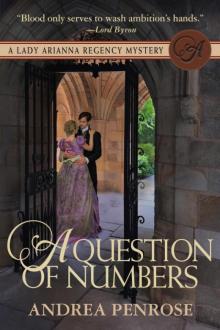 A Question of Numbers
A Question of Numbers Murder at Queen's Landing
Murder at Queen's Landing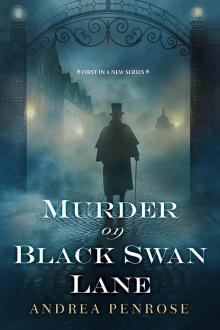 Murder on Black Swan Lane
Murder on Black Swan Lane Sweet Revenge
Sweet Revenge The Cocoa Conspiracy
The Cocoa Conspiracy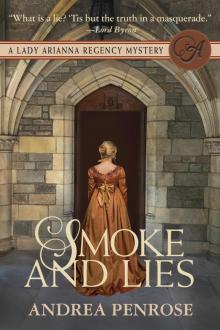 Smoke & Lies
Smoke & Lies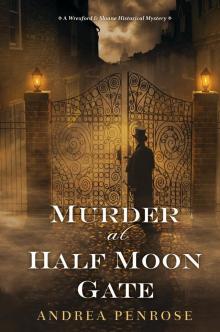 Murder at Half Moon Gate
Murder at Half Moon Gate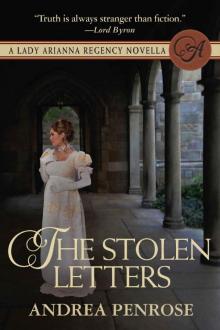 The Stolen Letters
The Stolen Letters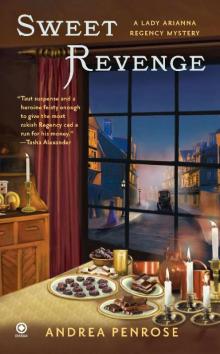 Sweet Revenge lahm-1
Sweet Revenge lahm-1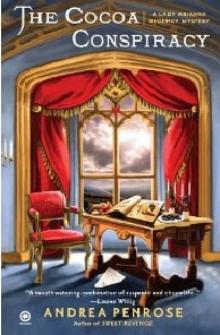 The Cocoa Conspiracy lahm-2
The Cocoa Conspiracy lahm-2